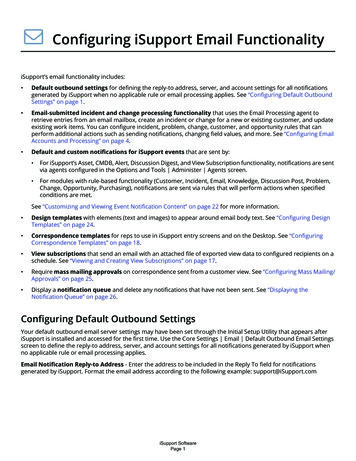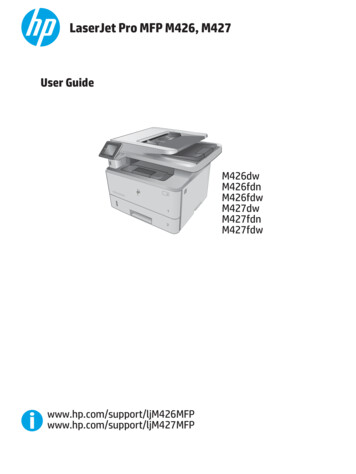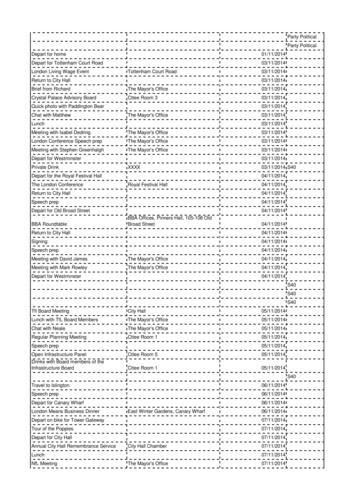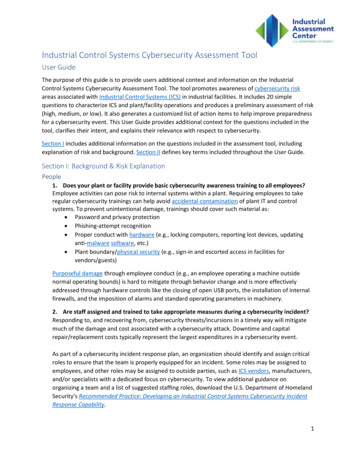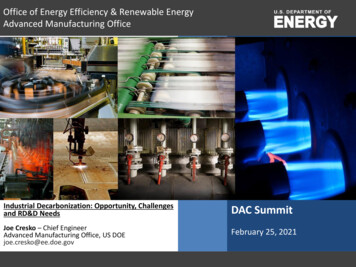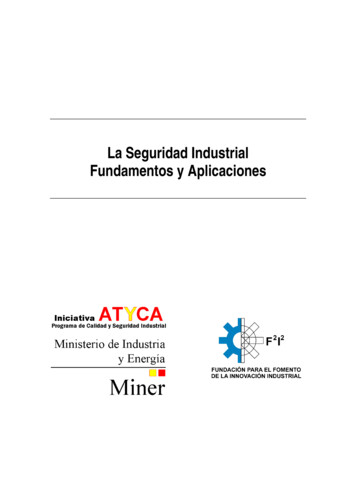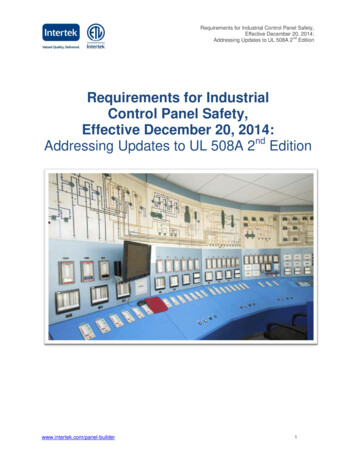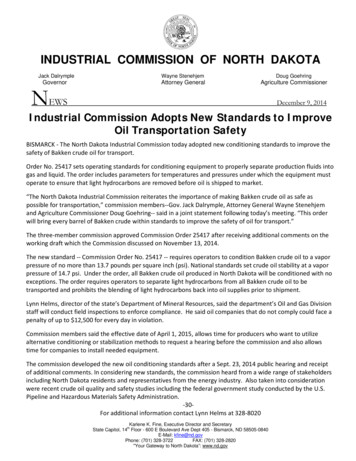
Transcription
INDUSTRIAL COMMISSION OF NORTH DAKOTAJack DalrympleGovernorNEWSWayne StenehjemDoug GoehringAttorney GeneralAgriculture CommissionerDecember 9, 2014Industrial Commission Adopts New Standards to ImproveOil Transportation SafetyBISMARCK - The North Dakota Industrial Commission today adopted new conditioning standards to improve thesafety of Bakken crude oil for transport.Order No. 25417 sets operating standards for conditioning equipment to properly separate production fluids intogas and liquid. The order includes parameters for temperatures and pressures under which the equipment mustoperate to ensure that light hydrocarbons are removed before oil is shipped to market.“The North Dakota Industrial Commission reiterates the importance of making Bakken crude oil as safe aspossible for transportation,” commission members--Gov. Jack Dalrymple, Attorney General Wayne Stenehjemand Agriculture Commissioner Doug Goehring-- said in a joint statement following today’s meeting. “This orderwill bring every barrel of Bakken crude within standards to improve the safety of oil for transport.”The three-member commission approved Commission Order 25417 after receiving additional comments on theworking draft which the Commission discussed on November 13, 2014.The new standard -- Commission Order No. 25417 -- requires operators to condition Bakken crude oil to a vaporpressure of no more than 13.7 pounds per square inch (psi). National standards set crude oil stability at a vaporpressure of 14.7 psi. Under the order, all Bakken crude oil produced in North Dakota will be conditioned with noexceptions. The order requires operators to separate light hydrocarbons from all Bakken crude oil to betransported and prohibits the blending of light hydrocarbons back into oil supplies prior to shipment.Lynn Helms, director of the state’s Department of Mineral Resources, said the department’s Oil and Gas Divisionstaff will conduct field inspections to enforce compliance. He said oil companies that do not comply could face apenalty of up to 12,500 for every day in violation.Commission members said the effective date of April 1, 2015, allows time for producers who want to utilizealternative conditioning or stabilization methods to request a hearing before the commission and also allowstime for companies to install needed equipment.The commission developed the new oil conditioning standards after a Sept. 23, 2014 public hearing and receiptof additional comments. In considering new standards, the commission heard from a wide range of stakeholdersincluding North Dakota residents and representatives from the energy industry. Also taken into considerationwere recent crude oil quality and safety studies including the federal government study conducted by the U.S.Pipeline and Hazardous Materials Safety Administration.-30For additional information contact Lynn Helms at 328-8020Karlene K. Fine, Executive Director and SecretaryState Capitol, 14th Floor - 600 E Boulevard Ave Dept 405 - Bismarck, ND 58505-0840E-Mail: kfine@nd.govPhone: (701) 328-3722FAX: (701) 328-2820"Your Gateway to North Dakota”: www.nd.gov
NORTH DAKOTAOil and Gas DivisionLynn D. Helms - DirectorBruce E. Hicks - Assistant DirectorDepartment of Mineral ResourcesLynn D. Helms - DirectorNorth Dakota Industrial Commissionwww.dmr.nd.gov/oilgas/Executive Summary - December 9, 2014:Commission Order #25417 is complex in chemistry, but simple when broken down into three key points.First, this commission order was written as a matter of safety. Rail accidents across the country have drawn attention for the need tobetter understand how Bakken oil is produced and processed at the well site. The commission initially received 1, 114 pages oftestimony from 33 groups or individuals, all providing input on how Bakken crude oil is produced and how to make it as safe aspossible to transport. Subsequent to the November 13, 2014 Industrial Commission meeting the record was opened and anadditional 141 pages of testimony from 25 groups or individuals were provided on the working draft order.Second, the resulting order is based on science from the testimony received . The goal is to produce crude oil that does not exceeda Vapor Pressure of 13.7 pounds per square inch (psi). National standards recognize oil with a Vapor Pressure of 14.7 psi or less tobe stable. Allowing for a Vapor Pressure of 13.7 psi or less, adjusts for an error margin of one psi in the sampling procedures andmeasurement equipment. It's important to note that winter blend gasoline has a Vapor Pressure of 13.5 psi.An estimated 80% of Bakken wells will be able to produce a product below 13.7 psi Vapor Pressure by complying with temperatureand pressure parameters detailed in paragraphs 2a through 2c of the commission order.(a)(b)(c)Operate all well site crude oil conditioning equipment within flow rate, pressure, and temperature ranges specifiedby the manufacturer.Operating at a pressure of no more than 50 psi must heat fluid to at least 110 degrees Fahrenheit.Operating at a pressure greater than 50 psi must heat fluid to at least 110 degrees Fahrenheit and install equipmentto recover vapors from the crude oil storage tanks.Roughly 15% of Bakken wells operate equipment described in item 2d. Operators will need to demonstrate through sampling andtesting in compliance with national standards that the resulting product does not exceed a Vapor Pressure of 13.7 psi.(d)Operating at temperatures and pressures not described in paragraphs (b) or (c) must demonstrate throughsampling and testing in compliance with national standards that Vapor Pressure is no greater than 13.7 psi.The remaining 5% of estimated wells are expected to seek alternative methods for conditioning or stabilizing crude oil and mustrequest approval from the commission through notice and hearing.(e)Facilities utilizing alternate methods for crude oil conditioning other than separators and/or emulsion heater-treaterswill only be approved after due notice and hearing.Finally, the standards described in the order are enforceable. The Oil and Gas Division's more than 30 field inspectors can visuallyinspect gauges on facility equipment to determine operating temperatures and pressures while oil and gas measurement staff canreview and approve Vapor Pressure testing. Additional Department of Mineral Resources staff has been included in the Governor'sbudget for dedication to western North Dakota. Operators found in violation of the order could be subject to a penalty of 12,500 aday. The order is effective April 1, 2015.In conclusion, with the strong science and enforceability of this order, the state of North Dakota will be requiring that every barrel ofBakken crude oil will be conditioned.600 E Boulevard Ave - Dept 405 , Bismarck, North Dakota 58505-0840 Phone (701)328-8020 Fax (701)328-8022
BEFORE THE INDUSTRIAL COMMISSIONOF THE STATE OF NORTH DAKOTACASE NO.23084ORDER NO. 25417IN THE MATTER OF A HEARING CALLED ONA MOTION OF THE COMMISSION TOCONSIDER AMENDING THE BAKKEN,BAKKEN/THREE FORKS, THREE FORKS,AND/OR SANISH POOL FIELD RULES TOESTABLISH OIL CONDITIONING STANDARDSAND/OR IMPOSE SUCH PROVISIONS ASDEEMED APPROPRIATE TO IMPROVE THETRANSPORTATIONSAFETYANDMARKETABILITY OF CRUDE OIL.ORDER OF THE COMMISSIONTHE COMMISSION FINDS:(1)This cause came on for hearing at 9:00 a.m. on the 23rd day of September, 2014.(2) This special hearing was called on a motion of the Commission to consider amendingthe Bakken, Bakken/Three Forks, Three Forks, and/or Sanish Pool field rules to establish oilconditioning standards and/or impose such provisions as deemed appropriate to improve thetransportation safety and marketability of crude oil.(3) Prior to the hearing, the Commission indicated it was seeking testimony of technicalnature for input on the following:(a) Typical operating temperature, pressure, and retention time of gas/liquidseparators;(b) Optimum operating gas/liquid separator temperature, pressure, and retention timeto effectively remove light hydrocarbons;(c) Typical operating temperature, pressure, and retention time of treaters;(d) Optimum operating treater temperature, pressure, and retention time to effectivelyremove light hydrocarbons;(e) Optimum oil stock tank pressure to effectively operate vapor collectionequipment;
Case No.Order No.2308425417(f) Optimum oil tank settling time prior to shipment;(g) Capital costs of typical gas/liquid separator and treating equipment;(h) Operating costs of typical gas/liquid separator and treating equipment;(i) Other field operation methods to effectively reduce the light hydrocarbons incrude oil; and(j) Crude oil quality and safety studies including but not limited to those conductedby American Fuel & Petrochemical Manufacturers, PHMSA & FRA OperationClassification, Transportation Safety Board of Canada, and Turner Mason &Company.Written comments were allowed no later than 5:00 p.m., Monday, September 22, 2014.(4) The Commission received written comments from Joel Noyes of Hess Corporation,Phillip Steck with the New York Legislature, Don Morrison of Dakota Resource Council, JohnZellitti of Triangle USA Petroleum Corporation including video, Ron Day of Tesoro, KariCutting of the North Dakota Petroleum Council (NDPC) including slides, and Tony Lucero ofEnerplus Resources USA Corporation.The record in this case was left open to allow American Fuel & Petrochemical Manufacturers tosubmit written comments. Comments were received October 1, 2014 and the record was closed.The following concerned land/royalty owners also submitted written comments: R.J. Larsen,Edward Decker, Paul Hanson, Nancy Casler, and Timothy Lane.The Commission also received written comments from Ron Schalow.(5) The Commission received oral comments at the hearing from Jon Ramer of TerrenusResources, Hal Cooper of CP&Y Engineering, Kari Cutting of NDPC, Jeff Hume on behalf ofthe NDPC, Brent Lohnes of Hess Corporation, Roger Kelley of Continental Resources, Inc.,Keith Lilie of Statoil Oil & Gas LP, Eric Bayes of Oasis Petroleum North America LLC, JeffHume of Continental Resources, Inc., Phil Archer of Whiting Oil and Gas Corporation, WayneKing of Grit Industries, Inc., Tony Lucero of Enerplus Resources USA Corporation, ColinNikiforuk of CRNG Energy Inc., Theodora Bird Bear, Scott Skokos, Marie Hoff, and LynnWolff of the Dakota Resource Council, Connie Triplett, a North Dakota State Legislator, JohnFanto of True Oil LLC, and Darrell Graf with the Fire Academy of North Dakota.(6) The Commission reopened the record in this matter on November 13, 2014 to allowadditional public comment until 5 p.m., Wednesday November 19, 2014, to specifically addresstechnical corrections within the Commission’s working draft order.Subsequently the Commission received written comments from Brian Wold of WPX EnergyWilliston LLC, Brent Lohnes of Hess Corporation, Tony Lucero of Enerplus Resources USACorporation, Matthew Gusdorf of XTO Energy Inc., Ron Ness of the North Dakota Petroleum(2)
Case No.Order No.2308425417Council, Nathan Savage of Savage Services Corporation, Christy Williamson of ONEOKRockies Midstream, Terry Kovacevich of Marathon Oil Company, Robert Greco with theAmerican Petroleum Institute, David Friedman with the American Fuel & PetrochemicalManufacturers, Taylor Reid of Oasis Petroleum North America LLC, Dennis Lindberg of SMEnergy Company, Jon Ramer of Catalytic Resources LLC, Lawrence Bender representing EOGResources Inc., Scott Skokos of the Dakota Resource Council, Jeff Hume of ContinentalResources Inc., Dennis Sutton of PetroQual LLC, Brent Miller of Whiting PetroleumCorporation, Colin Nikiforuk of CRNG Energy Inc., and Bret Wolz of HyCap Energy LLC.Nancy Casler, Paul Hanson, Randy Olson, Jeffrey Rodacker, and Gordon Schwallie alsosubmitted written comments as concerned citizens.(7) Some of the written comments indicated that this matter should be conducted underadministrative rulemaking. The Commission finds that matters such as this one are intended toaddress field operating practices for a limited number of producing pools and should be handledas has been done previously with subject matter similar in nature, as in: (1) Commission OrderNo. 14496 which set requirements for 2560-acre drilling and spacing units; (2) CommissionOrder No. 14497 which established 1280-acre drilling units within the Bakken Pool; (3)Commission Order No. 14498 which established a 200-feet setback relative to the heel and toe ofhorizontal Bakken Pool wells; and (4) Commission Order No. 24665 which modified flaringregulations for Bakken, Bakken/Three Forks, and Three Forks Pools.(8) Having allowed all interested persons an opportunity to be heard and having heard,reviewed, and considered all testimony and evidence presented, and the subsequent commentsreceived on the working draft order, the Commission makes the following conclusions. Much ofthe testimony and comments were relevant, but did not address the requested topics on which theCommission sought testimony and comments.IT IS THEREFORE ORDERED:(1)No well shall be hereafter produced in a Bakken, Bakken/Three Forks, Three Forks,and/or Sanish Pool (the Bakken Petroleum System), except in conformity with theregulations below without special order of the Commission after due notice andhearing.(2)All wells completed in the Bakken Petroleum System must be produced throughequipment utilizing the following conditioning standards to improve the marketabilityand safe transportation of the crude oil:(a) A gas-liquid separator and/or emulsion heater-treater of ample capacity and ingood working order that effectively separates the production into gaseous andliquid hydrocarbons, must be operated within manufacturer’s recommendedoperating limits;(b) Production facilities utilizing a gas-liquid separator and/or an emulsionheater-treater operating at a pressure of no more than 50 psi on the final stage ofseparation prior to the crude oil storage tanks must heat the produced fluids to atemperature of no less than 110 degrees Fahrenheit. Such temperature may be(3)
Case No.Order No.2308425417applied in the emulsion heater-treater or prior to the fluids entering the separatorif no emulsion heater-treater is utilized; or(c) Production facilities utilizing a gas-liquid separator and/or an emulsionheater-treater operating at a pressure greater than 50 psi on the final stage ofseparation prior to the vapor recovery system or crude oil storage tanks must heatthe produced fluids to a temperature of no less than 110 degrees Fahrenheit andshall also be required to install a vapor recovery system on or immediatelyupstream of the crude oil storage tanks; or(d) Production facilities utilizing gas-liquid separator(s) and/or emulsionheater-treater(s) operating at pressures and temperatures other than those providedin (b) or (c) above shall be allowed only upon the operator demonstrating that theoperating pressures and temperatures of the separator(s) and/or emulsionheater-treater(s) are producing crude oil with a Vapor Pressure of Crude Oil(VPCRx) no greater than 13.7 psi or 1 psi less than the vapor pressure ofstabilized crude oil as defined in the latest version of ANSI/API RP3000whichever is lower. Such test must be performed by a person sufficiently trainedto perform the test. All VPCRx tests shall be performed in accordance with thelatest version of ASTM D6377 and shall be conducted quarterly. Samples fortesting must be collected in accordance with ASTM D3700 or ASTM D5842 atthe point of custody transfer. A Sundry Notice (Form 4) shall be submitted to theDirector within 15 days of the test date which includes a screen shot and/orprintout of the VPCRx test conducted and details the operating capacities,pressures, and temperatures of all well site conditioning equipment at the time ofthe test; or(e) Production facilities utilizing an alternative oil conditioning method other than agas-liquid separator(s) and/or an emulsion heater-treater(s) will only be approvedby the Commission after due notice and hearing, and must: (a) be capable ofdelivering crude oil with a VPCRx no greater than 13.7 psi at custody transfer; or(b) provide safe transportation of marketable crude oil to a crude oil conditioning orstabilization plant.(f) Commission personnel will periodically inspect production facilities and recordsto confirm operator compliance with the standards and requirements containedherein. Noncompliance could result in the Commission issuing civil and criminalpenalties pursuant to North Dakota Century Code § 38-08-16.(3)The following practices are hereby prohibited:(a) Blending crude oil produced from the Bakken Petroleum System with liquidsrecovered from gas pipelines prior to custody transfer; and(b) Blending crude oil produced from the Bakken Petroleum System with natural gasliquids (i.e. condensate, pentanes, butanes, or propane) prior to custody transfer.(4)
Case No.Order No.2308425417(4) The operator of any transload rail facility shall notify the Director of discovering thatany crude oil received from the Bakken Petroleum System violates federal crude oil safetystandards. The notice shall indicate: (a) the federal standard violated and the date; (b) theprobable source of such crude oil, if known; and (c) an outline on the final disposition of suchcrude oil and the process subsequently utilized to provide the safe transportation of such crudeoil.(5) The Commission shall have continuing jurisdiction in this matter and specificallyreserves the authority, upon its own motion or the motion of any interested party, to: (a) reviewsuch requirements outlined herein; (b) determine whether additional requirements are warranted;and (c) make such further amendments or modifications as the Commission deems appropriate.(6) This order is hereby effective April 1, 2015, shall cover all wells completed in theBakken Petroleum System, and shall continue in full force and effect until further order of theCommission.Dated this 9th day of December, 2014.INDUSTRIAL COMMISSIONSTATE OF NORTH DAKOTA/s/ Jack Dalrymple, Governor/s/ Wayne Stenehjem, Attorney General/s/ Doug Goehring, Agriculture Commissioner(5)
Industrial Commission Adopts New Standards to Improve Oil Transportation Safety . State Capitol, 14th Floor - 600 E Boulevard Ave Dept 405 -Bismarck, ND 58505-0840 E-Mail: kfine@nd.gov Phone: (701) 328-3722 FAX: (701) 328-2820 . First, this commission order was written as a matter of safety. Rail accidents across the country have drawn .


